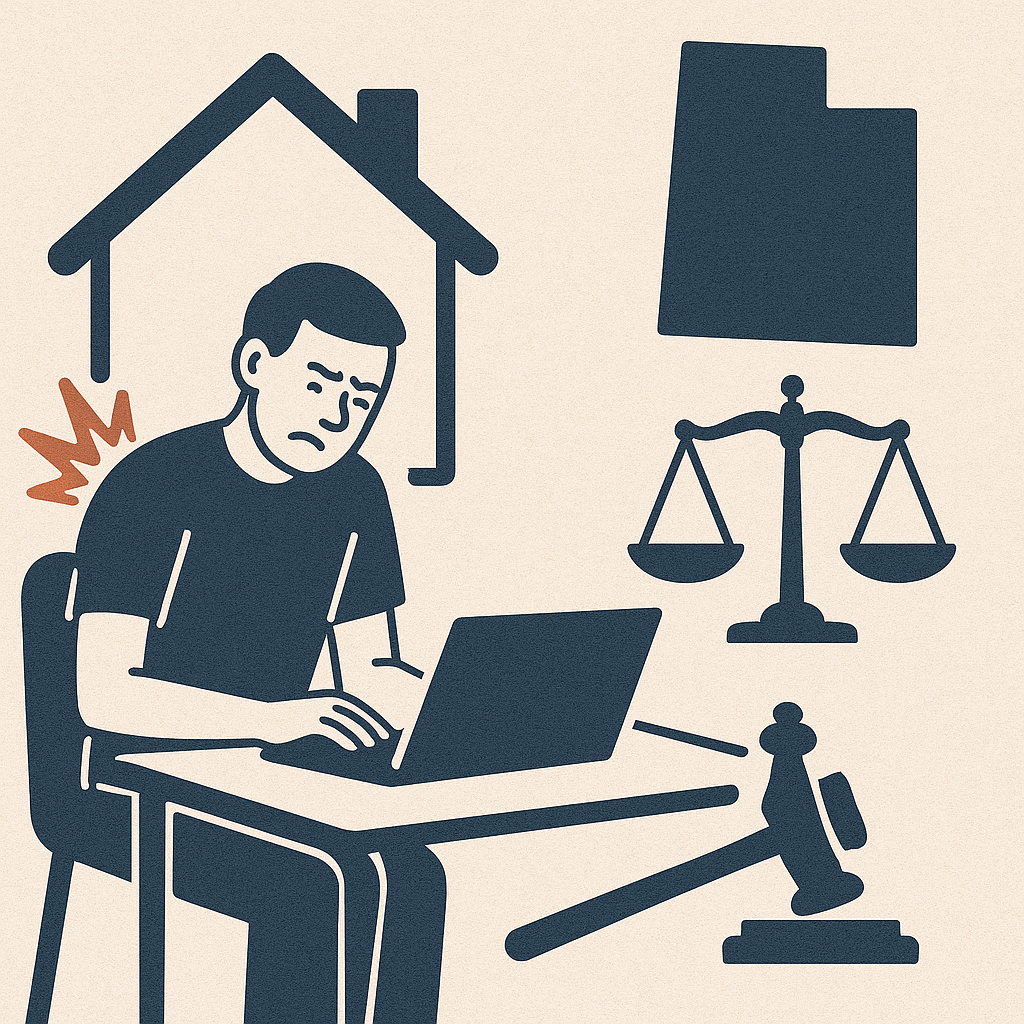Home-Based Injury Claims in Utah
Plain-English guide to remote-work injuries, workers’ compensation, and documentation for Utah employees
Remote work has changed where many Utahns do their jobs, but it has not changed the fact that employees can still be injured while performing work duties. A fall while carrying equipment to a home office, a back injury caused by a poor desk setup, or a mental health condition linked to workload or stress can all be considered work-related under the right circumstances.
Utah Law Explained provides plain-English legal information so Utah workers and employers can understand their options. This guide is legal information, not legal advice.
Home Office Injuries Are Still Workplace Injuries
Under Utah law, workers’ compensation focuses on whether an injury “arises out of and in the course of employment.” That standard does not disappear just because the employee’s workplace is their living room or spare bedroom.
If a Utah employee is doing their job and suffers an injury during that work, they may still have a claim even if the accident happens at home. The key questions are what the worker was doing, when they were doing it, and why they were doing it.
What Counts as “Work-Related” in a Utah Home Office
To qualify for workers’ compensation in Utah, a home-based injury usually must happen while the employee is performing job duties or a task reasonably connected to their work. Examples can include:
- Tripping over a power cable while walking to answer a work call
- Straining a shoulder while lifting boxes of work materials
- Developing back pain from long hours in a non-ergonomic chair while meeting deadlines
- Repetitive-strain injuries from constant typing or mouse use for job tasks
By contrast, injuries that happen during purely personal activities at home, such as doing laundry, taking care of children, or exercising on a lunch break, are less likely to be treated as work-related. The closer the activity is to a specific work assignment or schedule, the stronger the connection under Utah workers’ compensation rules.
Employer Reporting, Responsibility, and Liability
Even when everyone works remotely, Utah employers still have reporting obligations when an employee is hurt on the job. Remote workers should treat a home-office injury much like any other workplace injury.
Typical steps include:
- Notify your supervisor or HR department as soon as possible after the injury.
- Write down when the injury occurred, what you were doing, and who you informed.
- Follow company policies for incident reports or workers’ compensation claims.
The employer’s workers’ compensation carrier will evaluate whether the injury appears tied to work activity. Employers should be prepared to document the employee’s job duties, remote-work arrangement, and any policies about hours and workspace setup.
Ergonomic and Repetitive-Stress Claims for Remote Workers
Some Utah home-based injury claims involve slow-building conditions instead of a single accident. Common examples include:
- Carpal tunnel syndrome from heavy keyboard or mouse use
- Neck and back pain caused by long hours at a kitchen table or couch
- Shoulder and arm strain from poorly placed monitors or laptops
These conditions may still be covered if medical providers can link them to the worker’s job duties. Remote workers can help themselves by documenting:
- How many hours per day they spend at the computer
- What kind of workstation, chair, and equipment they use
- When symptoms first appeared and how they have changed over time
Sometimes employers offer ergonomic support or equipment to reduce these risks. Keeping records of those conversations and any changes to the home office can also be useful in a Utah workers’ compensation claim.
Mental Health Claims for Utah Remote Employees
Remote work can blur the line between home and office, which may increase stress for some employees. In limited situations, mental health conditions related to work can be part of a Utah workers’ compensation analysis.
These claims are complex and typically require:
- Clear medical documentation of a diagnosed mental health condition
- Evidence that the condition is primarily caused by job-related stressors
- Proof that the stress is beyond ordinary workplace pressure
Work-related trauma, harassment, or major changes in workload can affect mental health. Remote workers who believe their condition is tied to work should discuss both treatment and legal options with qualified professionals.
Documentation Tips and a Quick Checklist After a Home Injury
Strong documentation can make or break a Utah home-based injury claim. Remote workers should try to build a clear timeline that shows how the injury connects to their job.
Helpful documentation steps include:
- Take photos of the workspace and the area where the injury happened.
- Save emails, messages, or calendar entries that show what you were working on.
- Keep copies of medical records, doctor notes, and work restrictions.
- Note any changes you made to your home office after the injury.
Quick checklist for Utah remote workers after a home-office injury:
- Report the injury to your employer promptly.
- Seek medical care and follow treatment recommendations.
- Ask how to start a workers’ compensation claim.
- Track symptoms, time off work, and any lost wages.
- Avoid mixing personal activities with work when describing what happened.
Video & Social Learning Hub for Remote Work Injuries
YouTube: Remote Work Injury and Workers’ Compensation
Instagram: Quick Tips for Home-Based Injury Claims
Need Help After a Home-Office Injury in Utah?
Understanding how Utah’s workers’ compensation laws treat home-based injuries helps remote employees protect their rights and avoid common pitfalls. Injuries at home can qualify as work-related, but strong documentation and timely reporting often make the difference in a claim.
Talk to a Utah AttorneyFor more plain-English legal guidance, stay updated with Utah Law Explained, explore our mission on the About Us page, or connect with trusted counsel like Gibb Law Firm.
